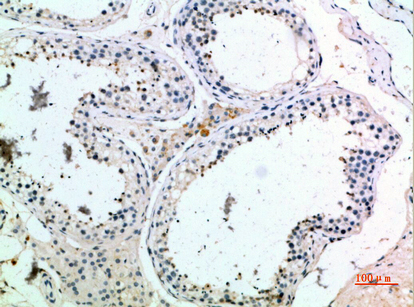PMCH Polyclonal Antibody
- Catalog No.:YT6004
- Applications:IHC;IF;ELISA
- Reactivity:Human;Mouse;Rat
- Target:
- PMCH
- Fields:
- >>Neuroactive ligand-receptor interaction
- Gene Name:
- PMCH MCH
- Protein Name:
- Pro-MCH [Cleaved into: Neuropeptide-glycine-glutamic acid (NGE) (Neuropeptide G-E); Neuropeptide-glutamic acid-isoleucine (NEI) (Neuropeptide E-I); Melanin-concentrating hormone (MCH)]
- Human Gene Id:
- 5367
- Human Swiss Prot No:
- P20382
- Mouse Swiss Prot No:
- P56942
- Rat Swiss Prot No:
- P14200
- Immunogen:
- Synthetic peptide from human protein at AA range: 112-161
- Specificity:
- The antibody detects endogenous PMCH
- Formulation:
- Liquid in PBS containing 50% glycerol, 0.5% BSA and 0.02% sodium azide.
- Source:
- Polyclonal, Rabbit,IgG
- Dilution:
- IHC 1:50-200, ELISA 1:10000-20000. IF 1:50-200
- Purification:
- The antibody was affinity-purified from rabbit antiserum by affinity-chromatography using epitope-specific immunogen.
- Concentration:
- 1 mg/ml
- Storage Stability:
- -15°C to -25°C/1 year(Do not lower than -25°C)
- Other Name:
- Pro-MCH [Cleaved into: Neuropeptide-glycine-glutamic acid (NGE;Neuropeptide G-E);Neuropeptide-glutamic acid-isoleucine (NEI;Neuropeptide E-I);Melanin-concentrating hormone (MCH)]
- Background:
- pro-melanin concentrating hormone(PMCH) Homo sapiens This gene encodes a preproprotein that is proteolytically processed to generate multiple protein products. These products include melanin-concentrating hormone (MCH), neuropeptide-glutamic acid-isoleucine (NEI), and neuropeptide-glycine-glutamic acid (NGE). Melanin-concentrating hormone is a 19-amino acid neuropeptide that stimulates hunger and may additionally regulate energy homeostasis, reproductive function, and sleep. Pseudogenes of this gene have been identified on chromosome 5. [provided by RefSeq, Jul 2015],
- Function:
- function:MCH may act as a neurotransmitter or neuromodulator in a broad array of neuronal functions directed toward the regulation of goal-directed behavior, such as food intake, and general arousal. May also have a role in spermatocyte differentiation.,PTM:Differentially processed in the brain and in peripheral organs producing two neuropeptides; NEI and MCH. A third peptide, NGE, may also be produced. Preferential processing in neurons by prohormone convertase 2 (PC2) generates NEI. MCH is generated in neurons of the lateral hypothalmic area by several prohormone convertases including PC1/3, PC2 and PC5/6.,similarity:Belongs to the melanin-concentrating hormone family.,tissue specificity:Predominantly expressed in lateral hypothalamus, also detected in pallidum, neocortex and cerebellum. Also found in thymus, brown adipose tissue, duodenum and testis (spermatogonia, early spermatocytes
- Subcellular Location:
- Secreted.
- Expression:
- Predominantly expressed in lateral hypothalamus, also detected in pallidum, neocortex and cerebellum. Also found in thymus, brown adipose tissue, duodenum and testis (spermatogonia, early spermatocytes and Sertoli cells). No expression in peripheral blood. In brain exclusively mature MCH and NEI peptides are present. In peripheral tissues a large product, encompassing the NEI and MCH domains of the precursor, is found predominantly.
- June 19-2018
- WESTERN IMMUNOBLOTTING PROTOCOL
- June 19-2018
- IMMUNOHISTOCHEMISTRY-PARAFFIN PROTOCOL
- June 19-2018
- IMMUNOFLUORESCENCE PROTOCOL
- September 08-2020
- FLOW-CYTOMEYRT-PROTOCOL
- May 20-2022
- Cell-Based ELISA│解您多样本WB检测之困扰
- July 13-2018
- CELL-BASED-ELISA-PROTOCOL-FOR-ACETYL-PROTEIN
- July 13-2018
- CELL-BASED-ELISA-PROTOCOL-FOR-PHOSPHO-PROTEIN
- July 13-2018
- Antibody-FAQs
- Products Images

- Immunohistochemical analysis of paraffin-embedded human-testis, antibody was diluted at 1:200



